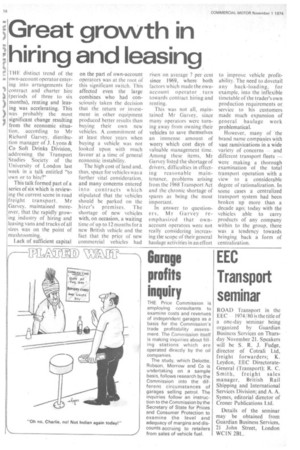0 Great growth in
Page 18

If you've noticed an error in this article please click here to report it so we can fix it.
hiring and leasing
THE distinct trend of the own-account operator entering into arrangements for contract and charter hire (periods of three to six months), renting and leasing was accelerating. This was probably the most significant change resulting from the economic situation, according to Mr Richard Garvey. distribution manager of J. Lyons & Co Soft Drinks Division, addressing the Transport Studies Society of the University of London last week in a talk entitled "to own or to hire?"
This talk formed part of a series of six which is reviewing the current scene in road freight transport. Mr Garvey, maintained moreover, that the rapidly growing industry of hiring and leasing vans and trucks of all sizes was on the point of mushrooming.
Lack of sufficient capital on the part of own-account operators was at the root of this significant. switch. This affected even the large combines who had consciously taken the decision that the return or investment in other equipment produced better results than buying their own new vehicles. A commitment of at least three years when buying a vehicle was not looked upon with much favour at a time of general economic instability.
The high cost of land and, thus, space for vehicles was a further vital consideration, and Many concerns entered into contracts which stipulated that the vehicles should be parked on the hirer's premises. The shortage of new vehieles with, on occasion, a waiting time of up to 12 months for a new British vehicle and the fact that the price of new C.ommercial vehicles had risen on average 7 per cent since 1969, where both factors which made the ownaccount operator . turn towards contract hiring and renting..
This was not all, maintained Mr Garvey, since many operators were turning away from owning their vehicles to save themselves an immense amount of worry which cost days of valuable management time. Among these items, Mr Garvey listed the shortage of drivers, difficulties in effecting reasonable maintenance, problems arising from the 1968 Transport Act and the chronic shortage of spares as being the most important.
In answer to questioners, Mr Garvey reemphasized that ownaccount operators were not really considering increasing the scope of their general haulage activities in an effort to improve vehicle profitability. The need to dovetail any back-loading, for example, into the inflexible timetable of the trader's own production requirements or. service to his customers made much expansion of general haulage work problematical.
However, many of •the brand name companies with vast ramivications in a wide variety of concerns •— and different transport fleets — were making a thorough examination of the total transport operation with a view to a considerable degree of rationalization. In some cases a centralized transport system had been broken up more than a decade ago; today with the vehicles able to carry products of any company within to the group, there was a tendency towards bringing back a form of centralization.






























































































